
Lennart Ootes / Anna Shtourman / Maria Emelianova / City of Toronto
Women's Candidates Preview
Brrr, Canada!North America is a far-away land rarely visited by the top women’s chess players, who all hail from Europe and Asia. But next week, the ice hockey capital of the world that is Canada will play host to the most important women’s chess tournament in the world, the Women’s Candidates.
This maple edition of the Candidates will be the first to combine the open and women’s sections of the tournament into a single event. The challengers to the reigning world champions Ju Wenjun and Ding Liren will be decided together. The games will be played out side-by-side. Pragg and Vaishali will be competing together once again.
The winners of the last two Women’s Candidates were Lei Tingjie and before that Aleksandra Goryachkina. They each lost their World Championship match to Ju Wenjun, albeit only by narrow margins. They are both participating in this Candidates again. And there is no doubt they are the two favourites to win once again. But only one of them at most will get to play in the next Women’s World Championship match.
Competitors
The Women’s Candidates pits eight of the top women’s chess players in the world against each other in a 14-round double-round-robin. It is essentially winner-take-all for a spot in the next Women’s World Championship match.
Most of the players are 2500+. All but one are GMs. And all of them are Top 12 in my WCC rankings. Four of the eight are seasoned veterans who are age 32+ and have been consistently rated above 2500 for nearly a decade or more. That is Tan Zhongyi (2521, WCC No. 4), Anna Muzychuk (2520, WCC No. 5), Kateryna Lagno (2542, WCC No. 6), and Humpy Koneru (2546, WCC No. 12). Then there are two young talents in their early 20s yet to truly break into the world elite. That is Vaishali Rameshbabu (2475, WCC No. 8) and Nurgyul Salimova (2432, WCC No. 9). And lastly, there are the two players safely in their prime who everyone else is chasing. That is 27-year-old Lei Tingjie (2550, WCC No. 2) and 25-year-old Aleksandra Goryachkina (2553, WCC No. 3).
The games are played in the standard FIDE time control, 90 minutes + 30 seconds increment, plus an additional 30 minutes at move 40. This is a different time control than the open section is using, which starts with 120 minutes instead of having increment. It remains to be seen whether the different time controls will cause confusion in the broadcast, but at least the women got the better time control.
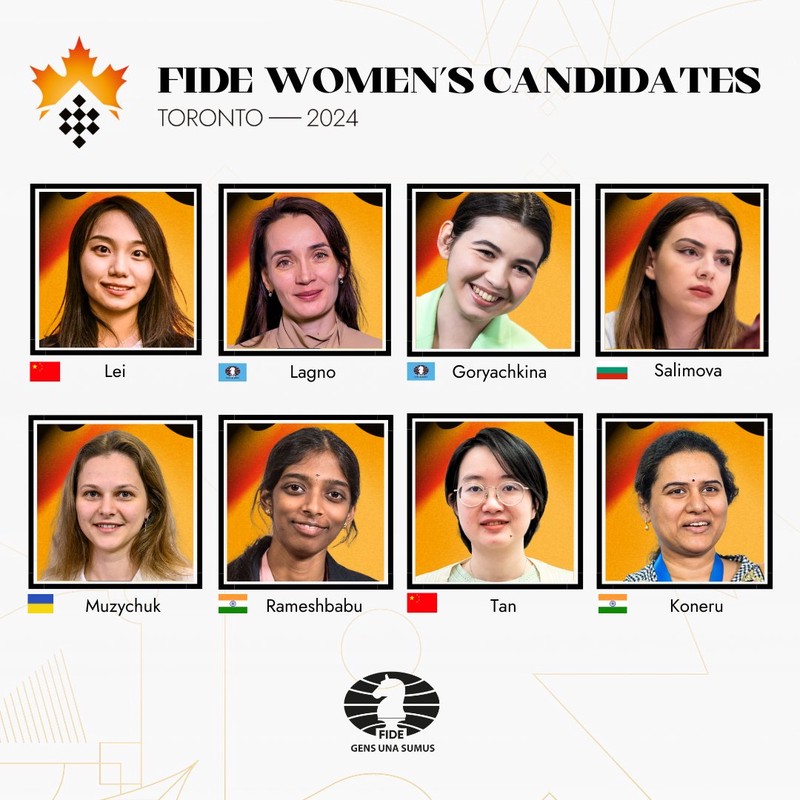
The Candidates! Credit: FIDE.
Background
This edition of the Candidates being the first to combine the open and women’s sections makes it sound like the two sections have always been held separately. That is not the case. Rather, the Women’s Candidates hasn’t even existed lately. It was abolished post 1997. It was only brought back quite recently in 2019. The reason there are only two former winners in the field is because those were the only two editions of the Candidates held in the last 25 years.
The revived Women’s Candidates hasn’t exactly gone smoothly. The last edition was delayed about two years, first due to the pandemic and then because of the Russian invasion of Ukraine. To make matters worse, the standard double round-robin format was then scrapped in favour of knockout matches to avoid any games between Russian and Ukrainian players. As a result, there has only really been one regular round-robin edition of the Women’s Candidates since 1997. That is the one won by Goryachkina in 2019, nearly five years ago. This upcoming edition will hopefully mark the beginning of the round-robin Candidates once again becoming a regular affair just like it used to be in the ’90s and before.
Favourites
Why Lei Tingjie will win the Candidates: Lei Tingjie is the best women’s chess player in the world who is not Ju Wenjun, and maybe even better than Ju Wenjun as well. Even though she has only played five classical tournaments in the last four-and-a-half years, she has been extremely consistent. She has not had a bad tournament since September 2019, and in that span has proven herself against the top women in the world as well as 2600s and even a few 2700s.
The inactivity hasn’t seemed to bother Tingjie, as she won the last Candidates even though it was her first classical tournament in ten months. If she wins this upcoming edition, she will again have done it despite it also being her first classical tournament in about ten months.
Tingjie is an extremely solid player who will be difficult for anyone to defeat. At the same time, she has a universal style in which she can also play for wins when necessary, and with success. She could get the five or six wins she needs to win the Candidates even if the field was just 2500s (like she did in the previous edition), but with the under-2500s it will be even easier.
Why Lei Tingjie won’t win the Candidates: Even though Lei Tingjie has done well despite being relatively inactive, she has had slow starts to tournaments, perhaps due to that inactivity. She played well and was close to winning the opening game of last year’s Candidates final against Tan Zhongyi, but still ended losing on a blunder. At the recent World Rapid Championship, she lost her second-round game to the young Lu Miaoyi, which ultimately led to her settling for bronze by the end.
A slow start at this upcoming Candidates could really hurt Lei Tingjie, since she has her most opportunistic pairings at the start. She opens against Tan Zhongyi (who she crushed in the Candidates final), Nurgyul Salimova (the bottom seed), and then White against Goryachkina (her main rival). A great start could set Tingjie up nicely, but a poor start could be troubling down the road.
Additionally, she likely was able to win the last Candidates because she was training rigourously in the preceding months when she wasn’t playing. It is presumable she has been doing that again this time around, but for all we know, that might not be the case.
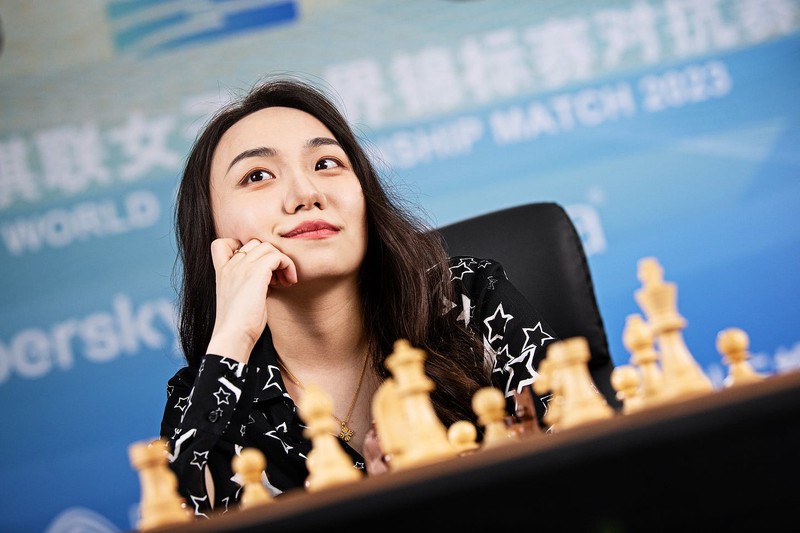
The Candidates defending champion. Credit: Stev Bonhage / FIDE.
Why Aleksandra Goryachkina will win the Candidates: Aleksandra Goryachkina at her best is the best women’s chess player in the world. She could draw 2600s at will, and compile a decent rate of wins against 2500s and 2600s. When she won the 2019 Candidates, she was only 20 years old and hadn’t even hit her stride yet, but still managed to clinch it with a staggering +6 score with two rounds to spare. She is the only player in the field who has won the Candidates in the current double round-robin format, and it is unclear if anyone else is really capable of that.
Goryachkina is a pure positional player that makes it difficult for opponents to get any sort of advantage against her. She can go for wins against very strong players, even 2600s, and has been quite successful at attaining winning positions. She also has the most intimidating presence at the board and can break her opponents mentally. Goryachkina had a mix of good and bad results last year, her best result being her convincing World Cup win. Among the recent tournaments she has played, her open national championship is probably the most similar to the Candidates and she did quite well there with a 2600+ performance.
At the last edition of the Candidates, Goryachkina was the clear favourite but didn’t even make the final. Nonetheless, she had two understandable criticisms that may have explained her underperformance. She didn’t receive the usual level of support from her federation because of the Russian invasion of Ukraine. And she was critical of the last-minute choice of venue in Uzbekistan due to the heat not working properly in the playing hall. Presumably she won’t have to deal with those issues this time around, and her federation even publicly announced they’ve supported her to do a training camp specifically for the Candidates.
Why Aleksandra Goryachkina won’t win the Candidates: Goryachkina is no longer the best women’s chess player in the world. She hit her peak a year to two years after her Candidates win when she crossed 2600 in 2021, but since then, her level has dropped and her 50+ point drop in rating is deserved. She has been making too many draws and has had trouble converting advantages.
While Goryachkina was practically unbeatable when she won the Candidates in 2019 and the few years thereafter, in the last year she has had more concerning losses to lower-rated players in the 2400s like Dinara Wagner and Mai Narva. That doesn’t bode well for her chances at avoiding losses to the even stronger 2500s who comprise most of the field. In the last two years, she has developed a rivalry with Tan Zhongyi, who knocked her out of the last Candidates. Goryachkina exacted revenge by knocking her out of the World Cup, but then lost to her again at the Grand Swiss. It’s been a good rivalry, but one Goryachkina really shouldn’t have when she’s supposed to be a clear step above Tan Zhongyi.
In general, Goryachkina has been less active in the last few years and the Candidates will be her first tournament of the year. She hasn’t played classical since the Women’s Grand Swiss all the way back in November, and she didn’t fare well at that tournament. She was probably only playing for prize money since she already qualified for the Candidates, but still barely scraped away the lowest prize. That level of form would definitely not suffice in the Candidates.
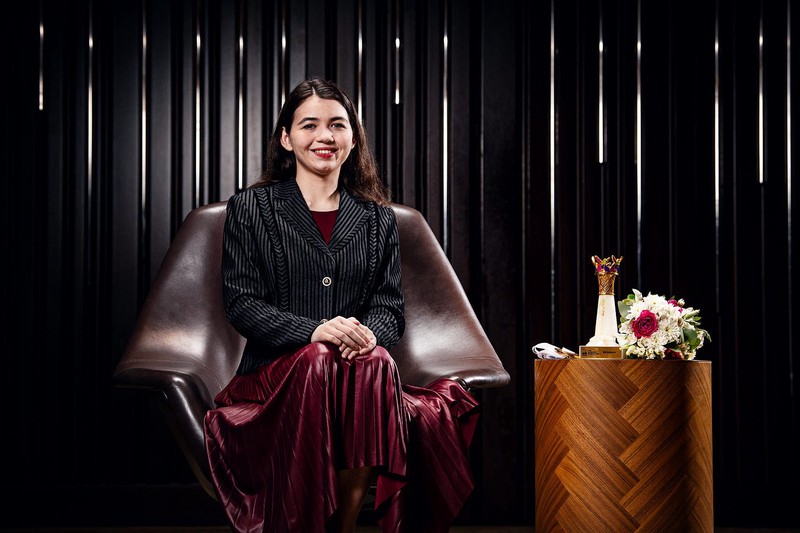
The reigning World Cup champion. Credit: Stev Bonhage / FIDE.
Outside chances
Why Vaishali will win the Candidates: If anyone else besides Lei Tingjie or Aleksandra Goryachkina wins the Candidates, I will be shocked. But if anyone can do it, it might be Vaishali. When Lei Tingjie and Goryachkina won the last two Women’s Candidates, they were young newcomers to the world elite still on the rise. They were already well-established, but not at the top of the world elite just yet. There is no one quite like that in the field this year who is young but already a solid 2500. However, if there was someone who was at least a solid young newcomer still on the rise, that would have to be Vaishali.
India’s newest GM has the support of her brother Pragg, her coach Ramesh, her sponsor RAMCO, and the Vishy-led WACA academy. Those are the kind of resources the other players don’t exactly have. Vaishali had two of the best performances of the year of any woman when she earned her final GM norm in Qatar and won the Women’s Grand Swiss back-to-back. In those two tournaments and the past two years in general, Vaishali has a good history of semi-regularly beating 2500 and 2600 GMs. If she can summon that form, she could contend.
Why Vaishali won’t win the Candidates: Beyond those two tournaments, Vaishali had a good year for a 2400 player, but not really a good year for a 2500 player. Whereas Lei Tingjie and Goryachkina had already been 2500 more than three years before they won the Candidates, Vaishali has yet to even reach a published rating of 2500. Additionally, her two major successes last year were in Swiss tournaments, not round-robins. The most similar tournaments she has played to the Candidates before were in the Women’s Grand Prix, and she didn’t fare well at either of those.
This year, Vaishali has only played one tournament, the Prague Challengers, and it could have went better. Her last tournament last year, the El Llobregat Open, didn’t go well after she completed her GM title early on. If those two tournaments are more indicative of her true level now, she won’t have a chance.
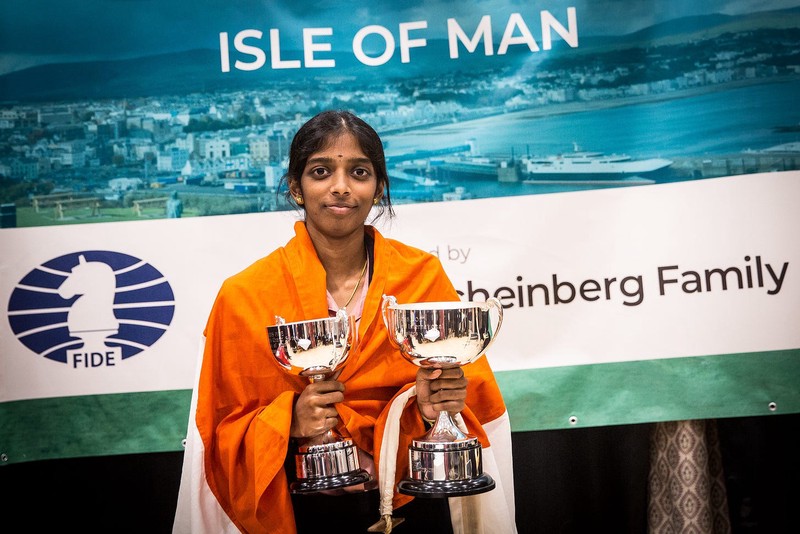
The reigning Grand Swiss champion. Credit: Anna Shtourman / FIDE.
Why Anna Muzychuk will win the Candidates: Anna Muzychuk has generally had a better career than her sister Mariya, but unlike her sister, she hasn’t been World Champion. For sure, she still wants to be World Champion too and she’s probably not going to get a better chance again than right now.
Anna was relatively inactive and not performing well ever since Russia invaded her country in early 2022. But in the middle of last year, she had a resurgence. She finished in 3rd place at the World Cup and 2nd place at the Grand Swiss, making her the only other player to qualify for the Candidates “twice” besides Goryachkina. Anna did well at the last two Candidates, finishing in 2nd place in 2019 and losing to the eventual winner in 2022. She knows what it’s like to come close. The only way to do better is to win.
Why Anna Muzychuk won’t win the Candidates: Anna’s successes at the World Cup and Grand Swiss were mainly from beating much lower-rated players. Against 2500s, she has been very prone to draws lately, including at those two tournaments. She would never be able to have enough decisive games to win the Candidates.
Rating-wise, Anna is at a low point. The last year-and-a-half she has spent in the 2520s or so is the first time she has been in the 2520s since 2011. Last summer, she was at risk of falling below 2500 for the first time in 15 years. That downward trend doesn’t seem to bode well for her Candidates chances.
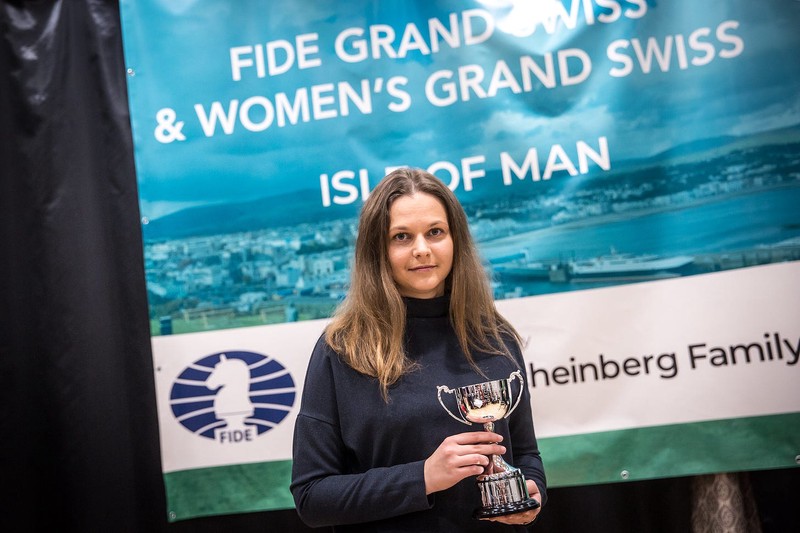
The Women’s Grand Swiss runner-up. Credit: Anna Shtourman / FIDE.
Long shots
Tan Zhongyi gets overlooked so easily. She has in fact been Women’s World Champion, right before Ju Wenjun. She is also my WCC No. 4 in the world right now. She beat both Lei Tingjie and Aleksandra Goryachkina last year. While she does excel at beating 2500s, she also got crushed in the Women’s Candidates final last year and is prone to too many losses at this level to win the whole tournament. But I do expect her to do well.
Neither the 34-year-old Kateryna Lagno, nor the 36-year-old Humpy Koneru have really had any good results in classical in the 12 months leading up to the Candidates. They are both great players who have had great careers, but if either of them were to win the Candidates now, it would really be out of nowhere and perhaps the greatest achievement of their career.
Nurgyul Salimova is certainly underrated, but not by enough to contend. This edition of the Candidates is probably too early for her to win, but the experience will hopefully help her return to win it some day. And expect her to take some scalps this time along the way.
What to Watch
It almost never happens that there are two former winners in the field still expected to contend, and this will be the first time the past two former winners will contest the Women’s Candidates while they’re still in their 20s, still in their prime. It’s clear Lei Tingjie and Aleksandra Goryachkina are the favourites. They’re both seeking a second chance. Head-to-head, they’ve barely even played each other, and not at all since they were teenagers. We don’t know what to expect from them at all, but we do expect them to win. It’s impossible that both of them will.
This upcoming Women’s Candidates will be different because it actually has two players who are not just young, but lower-rated, in Vaishali and Nurgyul Salimova. So often in chess lower-rated players just don’t get the right opportunities they deserve. The last two Candidates didn’t have any players under 2500, and the last Candidates didn’t even have any young players save for Goryachkina (who already won the thing). It will be exciting to see if Vaishali and Nurgyul do well.
Even beyond that, the lower-rated players change the whole dynamic of the tournament. In the previous two Candidates, if you wanted to contend, you didn’t know where your wins were supposed to come from because everyone was 2500 and about the same rating. Now it’s clear, Vaishali and Nurgyul are the easy targets. It might not bode well for them. It might be what gives them the opportunity to succeed. If anyone really crushes them both, it could give someone who isn’t good at beating 2500s the chance to win it all. Regardless of what happens, it should boost the number of decisive games in the tournament surely.
Pragg and Vaishali are playing the same tournament yet again. They just about always do the same, in terms of results. Will Pragg win the Candidates and lead to Vaishali unexpectedly winning the Women’s Candidates? Will Vaishali win the Women’s Candidates and lead to Pragg unexpectedly winning the Candidates? Only time will tell.
A potential extraneous issue for just about all of the players is none of them have much experience playing in North America. At last year's Cairns Cup, the top independent women's super-tournament, jet lag seemed to affect at least one player, and the tournament had a very surprising outcome of the lowest seed Anna Zatonskih winning the tournament. But even though those were also top players, it may not reflect what will happen this time around because these Candidates largely feature a different group of players. Hopefully, this group will know and have the resources to get acclimated in time.
Predictions
It’s difficult to tell not just who will win, but also who will do well because the participants have not been very active this year. The eight players combined have only played three tournaments so far in 2024. Of those three, Vaishali and Humpy didn’t have good tournaments. Nurgyul had a good tournament, but not “win the Candidates” good. But for all we know, maybe they were holding back to save their best for the real tournament, the Candidates.
All things considered, I think this tournament is going to the favourites. The last two Women’s Candidates were won by the fifth seeds. It seems like we’re due for one of the top seeds to win. I’m picking Lei Tingjie to win the Candidates and return to the Women’s World Championship match once again. My full standings predictions are:
- Lei Tingjie
- Aleksandra Goryachkina
- Anna Muzychuk
- Tan Zhongyi
- Vaishali
- Humpy Koneru
- Kateryna Lagno
- Nurgyul Salimova
And regardless of whether I’m right or wrong, I want Lei Tingjie or Aleksandra Goryachkina to win because at this time, I don’t think anyone else would be a good challenge for Ju Wenjun, at least in the very near future.
What does everyone else think will happen? I asked the experts to predict who will win the tournament and this is who they chose!
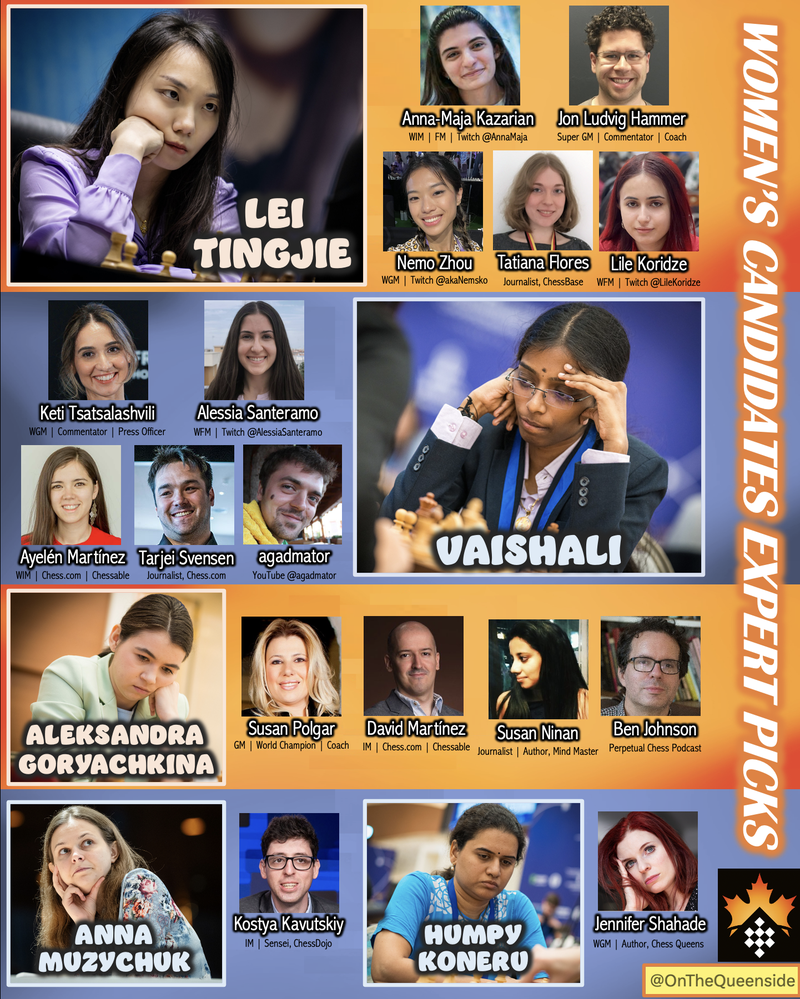
Expert picks for the FIDE Women’s Candidates. Credit: OnTheQueenside. Image credits: Lennart Ootes, Maria Emelianova, Stev Bonhage, among many others.
Overall, they pretty much agree with me that Lei Tingjie and Aleksandra Goryachkina are favourites, but they also support Vaishali as a third co-favourite as well even though she’s only the seventh seed out of eight!
Coverage
The Candidates start with Round 1 on Thursday, April 4 and continue with one game per day. The first rest day isn’t until after Round 4. Every round commences at 2:30 PM local time (8:30 PM CET, midnight in India, and 2:30 AM in China).
The percentage of coverage on the broadcast that goes to the Women’s Candidates is a good measure of how important they think women’s chess is compared to the men.
Personally, I think it’s perfect that both Pragg and Vaishali qualified for this first joint Candidates. What better way could there be to market the two tournaments as equal importance? After all, it's hard to be a true Pragg fan and not also be a Vaishali fan. (And even if you are a fan of Indian chess pulling for Gukesh or Vidit, you can still be a Vaishali fan too!)
You can watch the Candidates through FIDE, featuring local commentators GM Eric Hansen and GM Aman Hambleton (the chessbrahs), almost-local GM Irina Krush, and the Tata Steel India guest commentator GM Viswanathan Anand. I’m sure chess.com will have their own coverage too, but they haven’t announced it yet. Each broadcast covers both Candidates tournaments. (UPDATE: Actually, chess.com just announced they're doing two separate broadcasts. Between FIDE and chess.com, you'll have the option to watch just the women, just the men, or both events at once!) See you there!
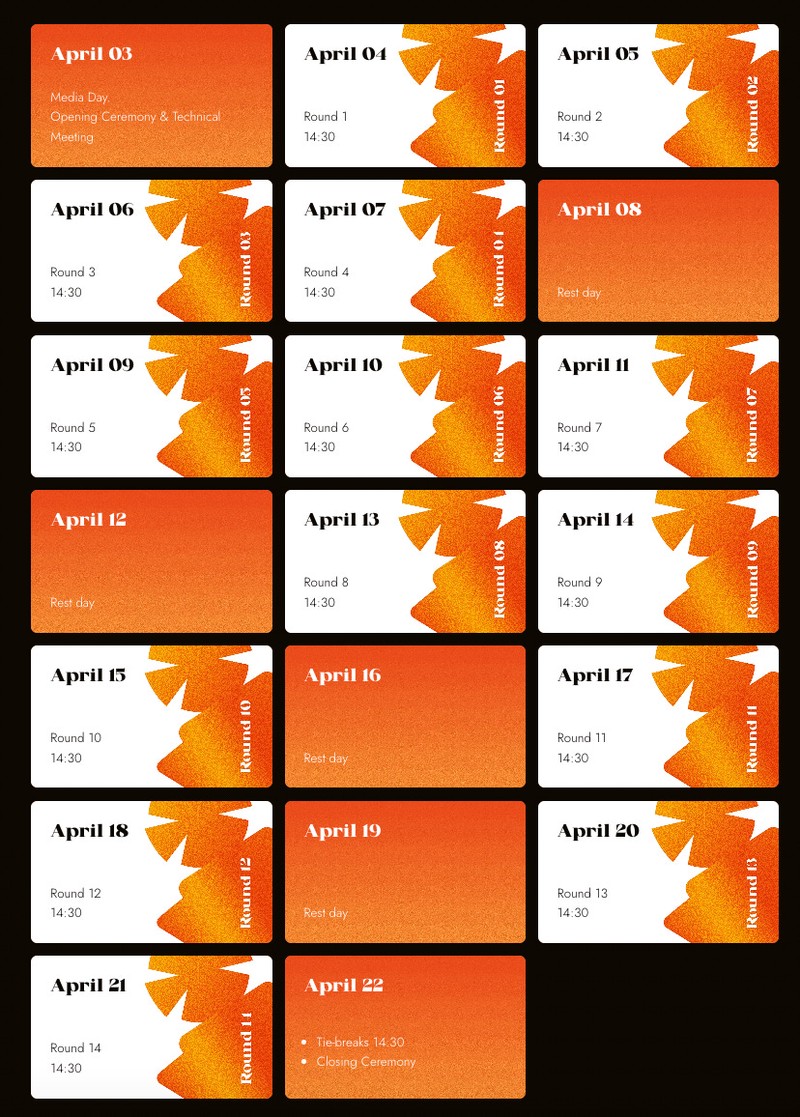
Candidates schedule. Credit: FIDE.
For daily coverage of women's chess, follow Women's Chess Coverage on Twitter. For more posts, check out Women's Chess Coverage on Substack, where you'll be able to catch every post before it goes up on lichess, plus extra posts and related content!
More blog posts by OnTheQueenside

Differences between FIDE Circuit and Women's FIDE Circuit
FIDE has launched another circuit.
Has the women's chess year gone as expected?
Not really! Except...
October Top 25 Women's Rankings: Divya to No. 6, & Hello Kashlinskaya!
Welcome to the Top 10!